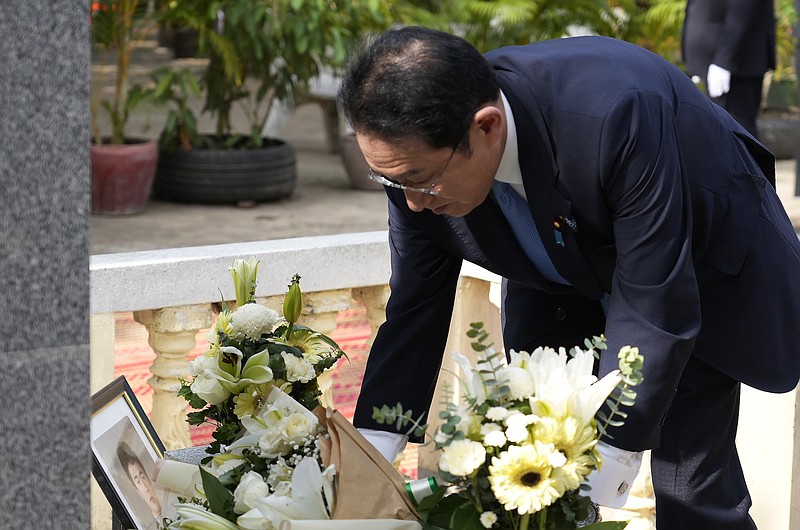PHNOM PENH, Cambodia -- Japanese Prime Minister Fumio Kishida visited Cambodia for talks with the country's longtime leader, Hun Sen, on Sunday to deepen relations and promote calls for the rule of law in one of the Southeast Asia's closest partners of both China and Japan.
Kishida and Hun Sen in a joint statement condemned Russia's aggression in Ukraine and called for "an immediate stop of the use of force and the withdrawal of the military forces from the territory of Ukraine." They stressed "neither threat nor use of all kind of weapons of mass destruction can ever be accepted in any occasion."
After China, Japan is Cambodia's largest donor and has funded the construction of bridges, roads, ports, electricity and water supply.
But Japan and the U.S. also share concerns over China's growing military assertiveness in the region. In Cambodia, the U.S. has been recently focused on China's construction of facilities at Ream Naval Base and the potential for its military to have future basing rights there.
Ream faces the Gulf of Thailand that lies adjacent to the South China Sea, where China has territorial disputes with its smaller Southeast Asian neighbors.
The joint statement, however, included language that appears to indirectly criticize some of China's actions in the South China Sea.
It said that Kishida and Hun Sen reaffirmed the importance of sustaining peace, security, safety, freedom of navigation in and overflight above the South China Sea, as well as non-militarization and peaceful resolution of disputes in accordance with international law, including the 1982 U.N. Convention on the Law of the Sea.
Beijing claims the South China Sea virtually in totality. China has also militarized several island outposts and rejects an international tribunal's ruling that its territorial claims are excessive.
The two leaders "reaffirmed to continue to cooperate towards realizing a 'Free and Open Indo-Pacific'" -- a vision Japan has been pushing with the United States to counter China's growing influence.
Speaking to Japanese reporters, Kishida said that it was meaningful that he was able to share determination with both Indian and Cambodian leaders during his trips to both countries this weekend not to allow any attempts to change the status quo by force "in any region."
"Realistically, it is impossible to expect all countries to agree on everything. It was a major achievement that we confirmed our basic stance that we do not tolerate any unilateral attempt to change the status quo by force," he said.
In the joint statement, Kishida also expressed his intention to support "the promotion of democracy and the rule of law such as holding elections in a way that reflects diverse voices from Cambodian people."
Kishida's visit came three days after the departure of two Japanese naval ships from Ream Naval Base, where the Japan Maritime Self-Defense Force conducted demining training with Cambodian counterparts.
The talks also covered the situation in military-ruled Burma, where the prime ministers called for the immediate cessation of violence and a stop to the flow of weapons after the army's ouster of the civilian administration of Aung San Suu Kyi in February last year.
Burma is often called Myanmar, a name that ruling military authorities adopted in 1989. Opposition leader Aung San Suu Kyi and other regime opponents have refused to adopt the name change, as have the U.S. and Britain.
They called on "all parties to exercise utmost restraint and commencement of a process of dialogue for peaceful solution, and the release of political detainees, as well as return to normalcy and the democratic political system."
Cambodia is the current chair of the Association of Southeast Asian Nations and Hun Sen is leading the group's efforts to ease the Burma crisis, which some U.N. experts have characterized as civil war.
Information for this article was contributed by Mari Yamaguchi of The Associated Press writer.
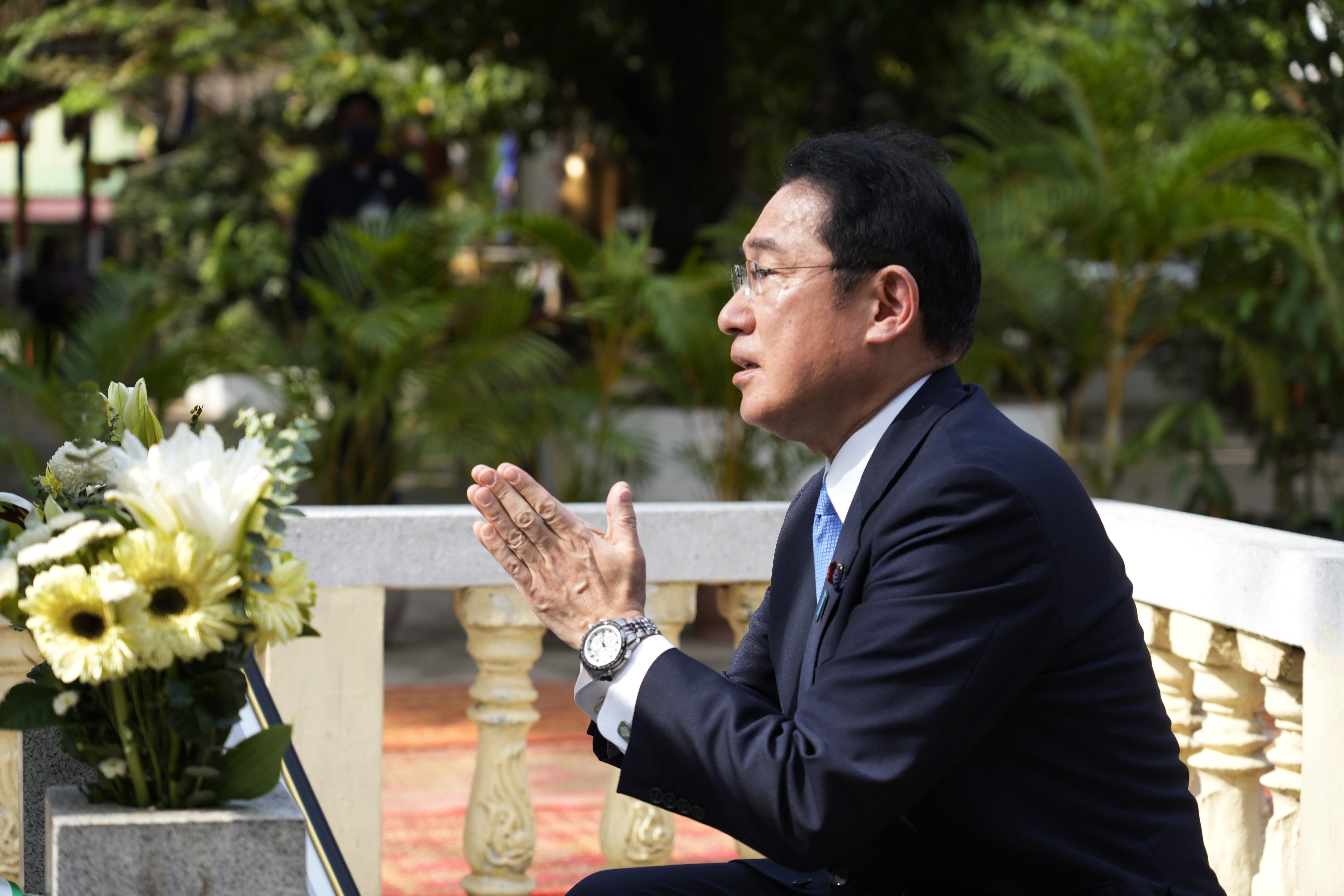 Japan's Prime Minister Fumio Kishida prays in front of the late Police Superintendent Haruyuki Takata places at the memorial in Taing Krasaing Pagoda near Phnom Penh International Airport, in Phnom Penh, Cambodia, Sunday, March 20, 2022. Japanese Prime Minister Fumio Kishida was in Cambodia for talks with his counterpart, Hun Sen, on Sunday to deepen relations with one of the Southeast Asia's closest partners of both China and Japan. (AP Photo/Heng Sinith)
Japan's Prime Minister Fumio Kishida prays in front of the late Police Superintendent Haruyuki Takata places at the memorial in Taing Krasaing Pagoda near Phnom Penh International Airport, in Phnom Penh, Cambodia, Sunday, March 20, 2022. Japanese Prime Minister Fumio Kishida was in Cambodia for talks with his counterpart, Hun Sen, on Sunday to deepen relations with one of the Southeast Asia's closest partners of both China and Japan. (AP Photo/Heng Sinith)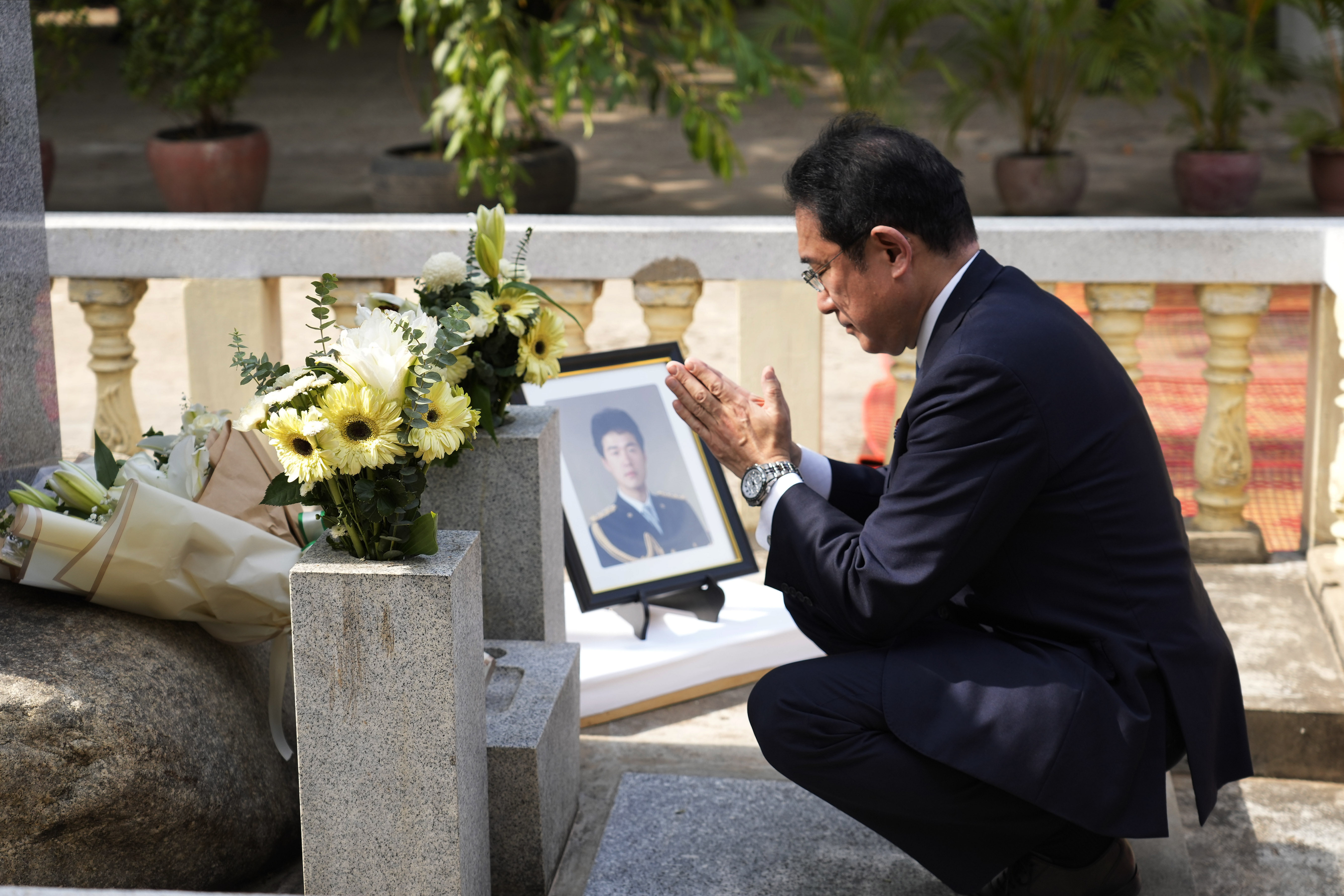 Japan's Prime Minister Fumio Kishida prays near a portrait of the late Police Superintendent Haruyuki Takata places at the memorial in Taing Krasaing Pagoda near Phnom Penh International Airport, in Phnom Penh, Cambodia, Sunday, March 20, 2022. Japanese Prime Minister Fumio Kishida was in Cambodia for talks with his counterpart, Hun Sen, on Sunday to deepen relations with one of the Southeast Asia's closest partners of both China and Japan. (AP Photo/Heng Sinith)
Japan's Prime Minister Fumio Kishida prays near a portrait of the late Police Superintendent Haruyuki Takata places at the memorial in Taing Krasaing Pagoda near Phnom Penh International Airport, in Phnom Penh, Cambodia, Sunday, March 20, 2022. Japanese Prime Minister Fumio Kishida was in Cambodia for talks with his counterpart, Hun Sen, on Sunday to deepen relations with one of the Southeast Asia's closest partners of both China and Japan. (AP Photo/Heng Sinith)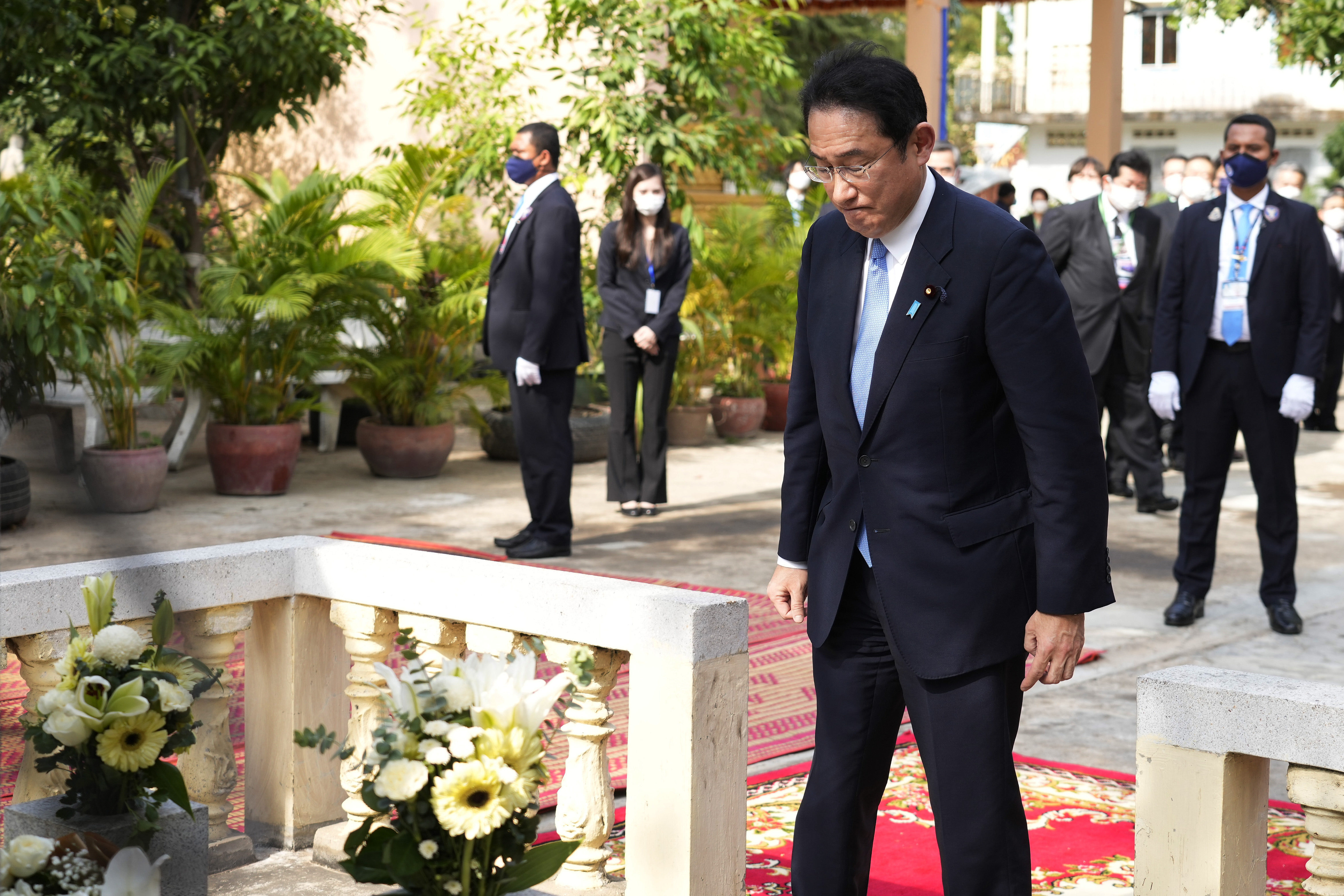 Japan's Prime Minister Fumio Kishida pays respect at the memorial of late Police Superintendent Haruyuki Takata in Taing Krasaing Pagoda near Phnom Penh International Airport, in Phnom Penh, Cambodia, Sunday, March 20, 2022. Japanese Prime Minister Fumio Kishida was in Cambodia for talks with his counterpart, Hun Sen, on Sunday to deepen relations with one of the Southeast Asia's closest partners of both China and Japan. (AP Photo/Heng Sinith)
Japan's Prime Minister Fumio Kishida pays respect at the memorial of late Police Superintendent Haruyuki Takata in Taing Krasaing Pagoda near Phnom Penh International Airport, in Phnom Penh, Cambodia, Sunday, March 20, 2022. Japanese Prime Minister Fumio Kishida was in Cambodia for talks with his counterpart, Hun Sen, on Sunday to deepen relations with one of the Southeast Asia's closest partners of both China and Japan. (AP Photo/Heng Sinith)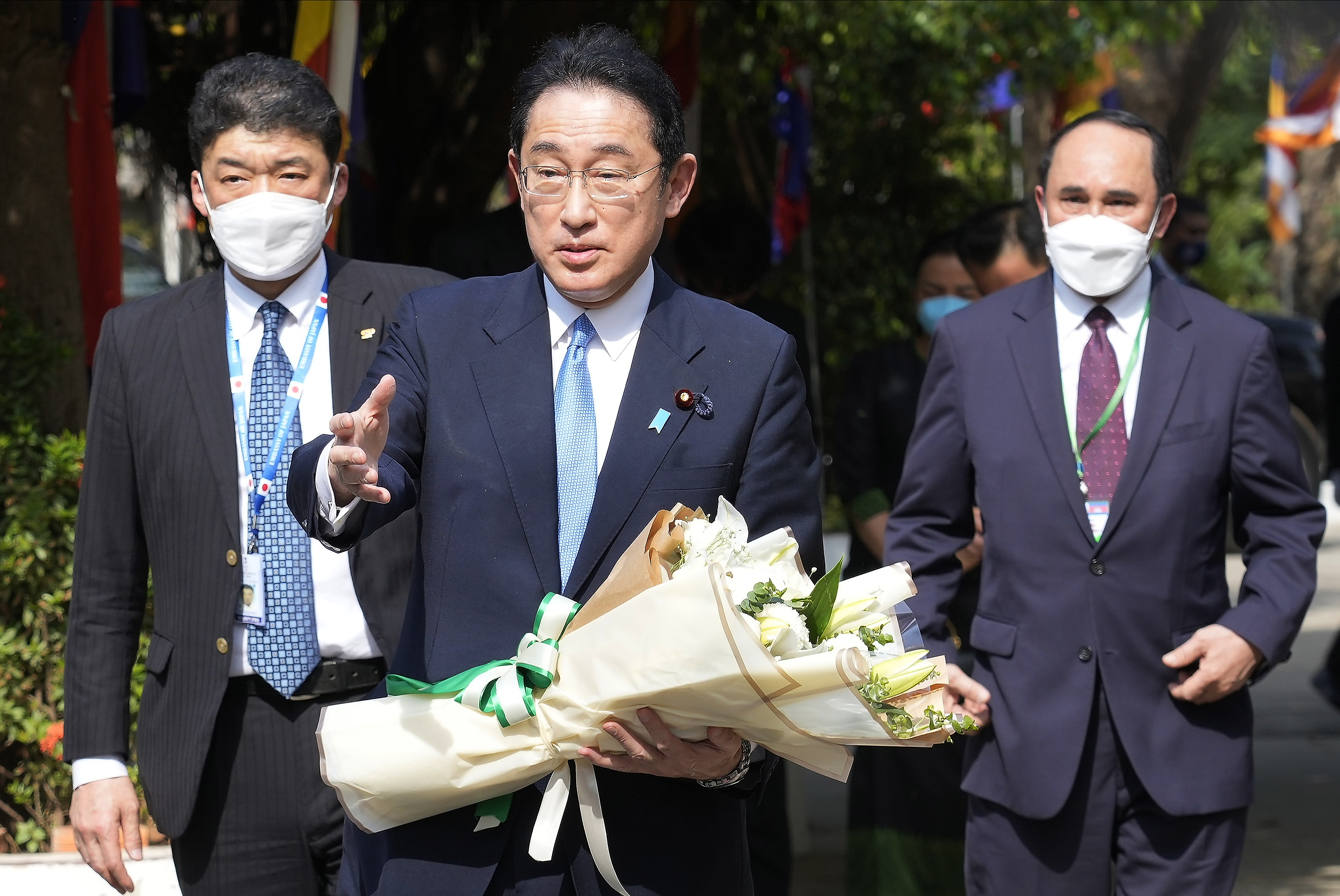 Japan's Prime Minister Fumio Kishida, center holds flowers in front of the memorial of late Police Superintendent Haruyuki Takata in Taing Krasaing Pagoda near Phnom Penh International Airport, in Phnom Penh, Cambodia, Sunday, March 20, 2022. Japanese Prime Minister Fumio Kishida was in Cambodia for talks with his counterpart, Hun Sen, on Sunday to deepen relations with one of the Southeast Asia's closest partners of both China and Japan. (AP Photo/Heng Sinith)
Japan's Prime Minister Fumio Kishida, center holds flowers in front of the memorial of late Police Superintendent Haruyuki Takata in Taing Krasaing Pagoda near Phnom Penh International Airport, in Phnom Penh, Cambodia, Sunday, March 20, 2022. Japanese Prime Minister Fumio Kishida was in Cambodia for talks with his counterpart, Hun Sen, on Sunday to deepen relations with one of the Southeast Asia's closest partners of both China and Japan. (AP Photo/Heng Sinith)